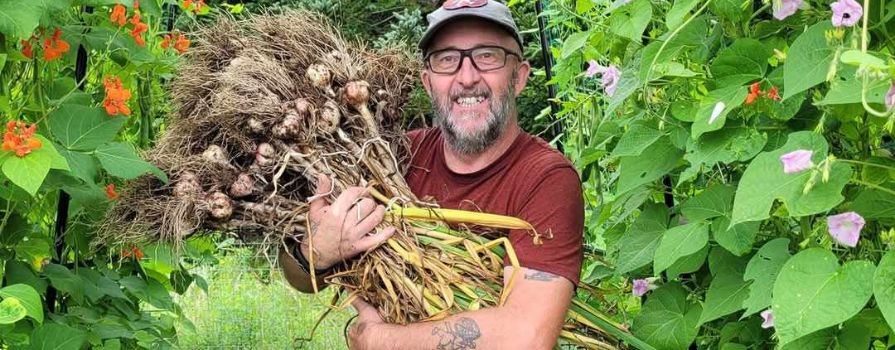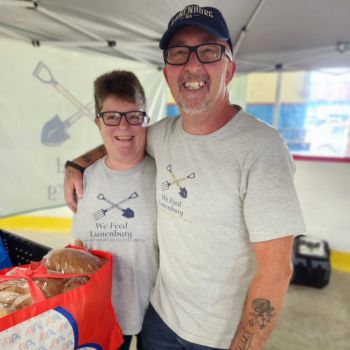Growing food and community support
Community Impact Award 2024 Recipient

David Jarvis (Boulanger & Baking Art ‘18), MBE, has seen many parts of the world throughout his career which has fueled his passion for raising awareness of food insecurity and knowledge of food cultivation.
Born and raised in Leicester, England, David served in the military for 22 years and spent seven years in Africa, some of which as a civilian.
“I have seen a terrible amount of suffering and poverty in my travels, more than anyone should ever have to and there were times when I felt an overwhelming sense of helplessness. I vowed never to have that feeling again” says David.
Once he retired from the military, David and his wife, Karen, lived in Italy for 10 years where their neighbours taught them how to grow their own food and raise livestock. Eventually turning their property into a self-sufficient farm, they learned how to avoid food waste and prepare for the winter.
To be closer to Karen’s family, they moved to her home province of Nova Scotia where David studied Boulanger & Baking Art at NSCC. Following his graduation in 2018, they made Lunenburg their home and David became a trailblazer for raising awareness of local food insecurity and a changemaker who empowered community members to collectively address the issue.
“He works tirelessly to help raise awareness in our community about food insecurity, encouraging others to donate excess produce and baked goods to our local Food Bank and our Community Food Pantry” says his wife, Karen.

Contagious passion mobilizes community
With David’s background in logistics, he knew the Covid-19 pandemic would worsen local food insecurity issues, so he set out to do something about it.
He used a greenhouse in his backyard to mirror the subsistence growing model he saw in Africa of providing food for yourself first, then your family and neighbours and wider community. At a peak in the summer, he could produce 150lbs of fresh produce for the food bank and in the winter, bake 32 loaves of bread, 48 muffins, 60 cookies and 15 bread rolls for each food bank.
“I set out to raise awareness and make it as easy as possible for people to help their own community,” says David.
He created the We Feed Lunenburg Facebook group in 2022 to bring like-minded community members together with the idea to build a self-sufficient community to provide food for those in need. Since the Lunenburg Foodbank only operates bi-weekly for four hours, David would collect community food donations from his car every Sunday at a local supermarket parking lot for two hours during summer.
Between the impressive community support and glaring need, David took his mission to address food insecurity a step further and started a community pantry in summer 2024.
“We opened the pantry to address the needs of those who are not served by the foodbank. The Water Market owners in Lunenburg have been brilliant and we would not be able to operate the pantry without them,” explains David, adding that the local business allows the pantry to be at the back of their building.
The panty is accessible 24/7 and includes a small cooler. A team of 10 volunteers restock it with items purchased from funds donated by the community, fresh produce in the summer and pre-cooked frozen meals in the winter.
“We have noticed very little correlation between clients of the foodbank and those who use the pantry,” says David. “We see a lot of ‘working poor’, young families who just need something to help them out. We also see a worrying number of seniors and newcomers.”
As part of his mission to address food insecurity, David has offered many free learning opportunities for community members to help equip them to make food for themselves or to donate.
This includes giving away over 400 fruit and vegetable transplants, providing advice on growing food and baking, running a baking class at the Farmer’s Market, creating how-to videos on YouTube and recently teaching a food literacy class for 11 yr olds, called Plants to Plates.
A charity by community for community
“After we opened the pantry and realised the extent of the need was much more than we thought, we formed the We Feed Lunenburg Association so that we could become a registered charity and really start to make an impact” says David.
The We Feed Lunenburg Association has established partnerships with 10 local organizations and many vendors at Farmer’s Markets to collect a range of donations, from feminine hygiene products to cooked meals, pet food and more.
“The unique factor about We Feed Lunenburg is that our aim is to create a self-sufficient community to provide for those in need 24/7. We are not a foodbank; we compliment the foodbank, and we also provide household items and personal hygiene products as well as food items and run purely on community donations” explains David.
We Feed Lunenburg is currently fundraising to build the Lunenburg Community Food Hub which will be a larger space that has a dedicated storage and sorting area for donations, and its primary function is to give their clients a ‘grocery store’ feel so they can effectively shop for what they need.
“We see our role as doing what we can to reduce food waste and being a conduit between those who care and those in need. We try and make it as easy as possible by creating a cumulative community effort to attract those with the means, the opportunity and most importantly, the willingness to make a difference in their community” says David.
“Our hope would be to see a “We Feed” in every town across the province. We know it’s only a ‘Band-Aid’ but it has to start somewhere. Charity begins at home after all.”
Fun fact: David has made a significant impact in communities around the globe, garnering him various awards including the Membership of the Order of the British Empire (MBE) by the late Queen, the NATO Meritorious Service Medal, and the Queens Platinum Jubilee Medal.
While supporting a mission in Bosnia, David raised money to get toys for SOS Children’s home in Sarajevo. During his 3-year tour in Kenya, he ran 32 projects in his spare time such as building classrooms (including special needs classrooms), stocking libraries, equipping a Muslim women’s medical clinic, providing clothing to rural communities, working with Kenya Social Services and Feed the Children to rescue abandoned babies and developing micro-finance schemes to assist those affected by HIV/AIDS in the slums of Nairobi. David also taught in a school in his off-duty hours whilst serving as a UN military observer in Sierra Leone.
